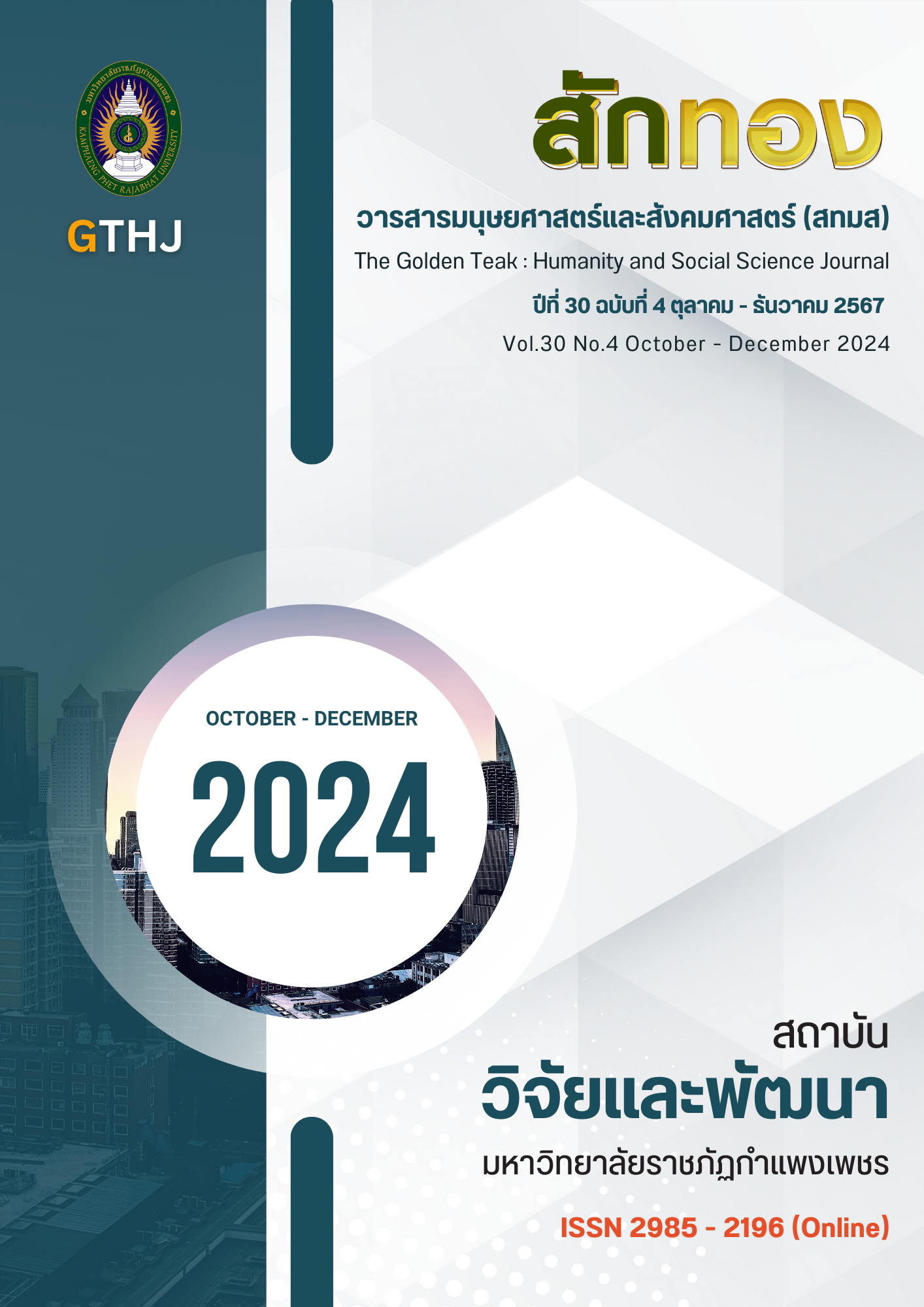The Problem Condition of Learning Management Flipped Classroom to Enhance the Thai Language Usage for Mathayomsuksa 3 Students
Main Article Content
Abstract
This research article is the result of the first stage of the research procedure. The research objectives were 1) to examine teachers’ perspectives on the practice and the problematic conditions of learning management through flipped classroom in order to enhance Mathayomsuksa 3 students’ Thai language usage, and 2) to examine the students’ perspectives on the situation of learning management through flipped classroom in order to enhance Mathayomsuksa 3 students’ Thai language usage. The target group of this research consisted of 15 teachers. The samples included 314 Mathayomsuksa 3 students at 12 schools administered by the Ubon Ratchathani Provincial Administrative Organization, selected by stratified random sampling. The instruments used for data collection were opinion questionnaires employed by the teachers and the students. The statistics utilized for the data analysis were percentage, mean, and standard deviation. The findings revealed that 1) the teachers’ perspectives towards the practice of learning management through flipped classroom, as a whole were at a moderate level, accounting for 69.50 percent. When broken down, the aspect with the highest level of implementation was assessment and evaluation, at 90.00 percent, while the lowest was content, at 39.05 percent. Their perspectives towards the problematic conditions of learning management through flipped classroom were overall moderate ( =2.69, S.D.=0.68). 2) The students’ perspectives on the practice of learning management through the flipped classroom as a whole were also at a moderate level, accounting for 67.11 percent. The aspect with the highest level of implementation was classroom atmosphere, at 73.17 percent, while content received the lowest level of implementation, at 52.67 percent. Their perspectives towards the problematic conditions of learning management through flipped classroom enhancing Thai language usage were overall at a moderate level (
=2.76, S.D.=0.72).
Article Details

This work is licensed under a Creative Commons Attribution-NonCommercial-NoDerivatives 4.0 International License.
บทความที่ได้รับการตีพิมพ์เป็นลิขสิทธิ์ของวารสาร สักทอง : วารสารมนุษยศาสตร์และสังคมศาสตร์ สถาบันวิจัยและพัฒนา มหาวิทยาลับราชภัฏกำแพงเพชร
ข้อคิดเห็นใดๆ ที่ปรากฎในวารสารเป็นวรรณกรรมของผู้เขียนโดยเฉพาะ ซึ่งมหาวิทยาลัยราชภัฏกำแพงเพชรและบรรณาธิการไม่จำเป็นต้องเห็นด้วย
References
Keefe, J. (2007, November). What is Personalization?. Phi Delta Kappan, 89(3), 217-223.
Lert Noppakhun Wong, S. (2009). State and Problems of Thai Language Learning Management for Mattayom Suksa 3 Students in Schools under The Office of Buriram Educational Service Area 2. Buriram : Buriram Rajabhat University. [In Thai]
National Institute of Educational Testing Service. (Public Organization). (2022). Summary on O-NET Test in the Academic Year 2021. [Online]. Available : http://www.newonetresult.niets.or.th/AnnouncementWeb/School/ ReportSchoolBySchool.aspx?mi=2 [2023, January 13]. [In Thai]
Outamung, S. (2023). Flipped Classroom : A Dream come True in Teacheing Thai Language. [Online]. Available : https://ejournals.swu.ac.th/index.php/jedu/article/view/6667/6289 [2023, February 20]. [In Thai]
Pan-Ngam, K. (2013). The Development Self Learning Package to Practice Information Technology and Communications Skills for Thai Language Teachers Prathomsuksa 3 In Central Region Based on The Concept of Learning in The 21st Century. Bangkok : National Research Council of Thailand (NRCT). [In Thai]
Panit, W. (2013). Teachers for Students to Create a Flipped classroom. (2 nd ed.). Bangkok : The Siam Commercial Foundation. [In Thai]
Phanphai, P. (2014). The Social Media Utilization with the Flipped Classroom Theory on Language for Communication to Enhance Learning Achievement of Prathomsuksa 6 Students. Thesis of Master of Education (Educational and Communications Technology), Major Field : Educational and Communications Technology, Department of Education Technology Kasetsart University. [In Thai]
Srihirun, W. (2017, April-June). Critical thinking with flipped classroom. Journal of Graduate School Sakon Nakhon Rajabhat University, 14(65), 25-26. [In Thai]
Srisa-aad, B. (2011). Preliminary Research. (9 th ed). Bangkok : Suviriyasarn. [In Thai]
Staker & Horn. (2012). Classifying K-12 Blended Learning. San Mateo CA : Innosight Institute.
Vanichbuncha, K. (2018). Statistics for Research. (12 th ed.). Bangkok : Samlada. [In Thai]


